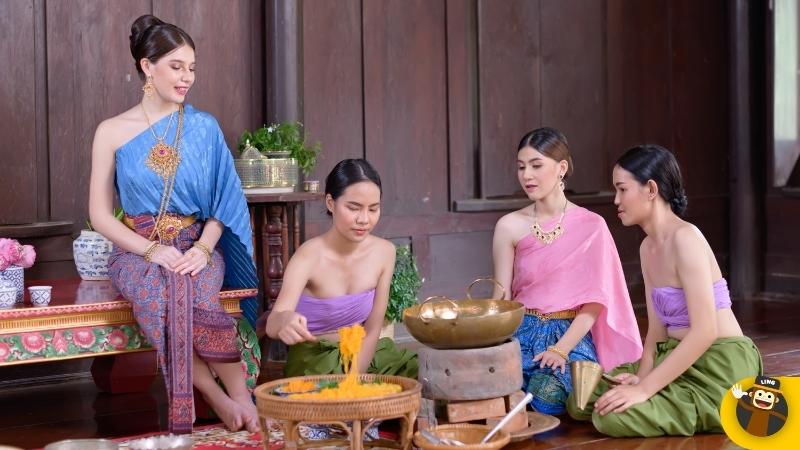Thai honorific terms are a feature of the Thai language. Therefore, you need to consider your listeners’ age, social status, and intimacy while speaking Thai.
Thai society values the unique gesture of ไหว้ (or wâi, pay respect) that not only greeting sign but also conveys a sense of humility and politeness. In addition, people of various ages, social classes, and professions are addressed differently in Thai culture, and a whole vocabulary of honorifics has developed through the years. Therefore, in addition to being polite, it also shows respect to that person.
So let’s see 4 topics you should learn about Thai honorific terms.
1. Thai Honorific Registers
Kings and monks make up the upper class of Thai society. Therefore, words fit only for monarchs, and monks have their place in the language. Below is a table comparing some terms from ordinary Thai, royal vocabulary, and clerical vocabulary.
| English Word | Standard Thai Word | Buddhist Clerical Word | Royal Word |
| Sleep | นอน (nɔɔn) | จำวัด (jam wát) | บรรทม (ban tom) |
| House | บ้าน (bâan) | กุฏิ (gù dtì) | วัง (wang) |
| Speak | พูด (pûut) | พูด (pûut) | ตรัส (dtràt) |
| Eat | กิน (gin) | ฉัน (chǎn) | เสวย (sà wə̌əi) |
2. Thai Honorific Pronominals

In Thai, personal pronouns are the most diverse and complex of all pronominal forms. You should consider your listeners’ age, position, and intimacy. Let’s explore some of the most widely used pronouns in Thai culture.
Family
Family terms like พ่อ (pɔ̂ɔ) father, แม่ (mɛ̂ɛ) mother, ยาย (yaai) grandmother, etc., may be familiar to you. In this article, however, we will discuss ways to use such terms with others, such as your parents’ close friends. Thus, age is essential. A speaker’s best guess regarding the listener’s age is the first step in selecting the most appropriate generational term.
พี่ (pîi) is used to add at the beginning of your given name.
- Older sister/brother
- Older cousin
- A friend’s older sibling
น้อง (nɔ́ɔng) is used to add at the beginning of your given name.
- Younger brother/sister
- Younger cousin
- A friend’s younger sibling
ลุง (lung), ป้า (bpâa), น้า (náa), and อา (aa) can be used with your parent’s friends and relatives. ลุง (lung) means uncle, and ป้า (bpâa) means aunt; used to add at the beginning of their given name if they’re older than your parents. น้า (náa) and อา (aa) mean uncle and aunt are used at the beginning of their given name if they’re younger than your parents.
Occupation & Status
Status and occupational words frequently function as first, second, and third person pronouns. In addition, some terms may be used as titles before actual names. Several common pronominal status words are listed below.
- ครู (kruu) – Teacher
- อาจารย์ (aa jaan) – Teacher or professor
- หมอ (mɔ̌ɔ) – Doctor
- พยาบาล (pá yaa baan) -Nurse
- แท็กซี่ (tɛ́k sîi) – Taxi driver
- ท่านนายกรัฐมนตรี (tâan naai gràt mon dtrii) – Mister or Madame Prime Minister
Royal Family
Over 67 million people call the constitutional monarchy of Thailand home. Today’s monarch is Maha Vajiralongkorn, also known as King Rama X. As a result, particular vocabulary is reserved for usage with the royal family.
People Speak To Royal Family Members
- ข้าพระพุทธเจ้า (kâa prá pút tá jâo) – I/me
- ใต้ฝ่าละอองธุลีพระบาท (dtâi fàa lá ɔɔng tú lii prá bàat) – Your Majesty/Highness
- ใต้ฝ่าละอองพระบาท (dtâi fàa lá ɔɔng prá bàat) – Your Majesty/Highness
- พระองค์ (prá ong) – His/Her Majesty or His/Her Highness
- ทูลกระหม่อม (tuun grà mɔ̀ɔm) – His/Her Royal Highness
Thai Theravada Buddhism
The constitution of Thailand declares all residents are free to practice their religion of choice. However, over 90% of the population belongs to the Theravada Buddhist religion. Therefore, knowing the appropriate Thai honorifics while addressing a Thai monk and also addressing yourself when speaking to the monk is important. So, let’s look at some examples down here.
Lay Buddhist Speak To Buddhist Clergy
- ผม (pǒm) – I/me (for male)
- กระผม (grà pǒm) – I/me (for male)
- ดิฉัน (dì chǎn) – I/me (for female)
- ท่าน (tâan) – You (a general monk)
- พระคุณเจ้า (prá kun jâo) – You (higher ranking monk)
- สามเณร (sǎam neen) – You (a very young monk)
Buddhist Clergy Speak To Lay Buddhist
- อาตมา (àat maa) – I/me
- โยม (yoom) – You
- โยมพ่อ (yoom pɔ̂ɔ) – You (mother)
- โยมแม่ (yoom mɛ̂ɛ) – You (father)
3. Thai Honorific Titles

Imagine you’re waiting for a service or at a store to be called. The Thai staff will likely address you by adding คุณ (kun) to the beginning of your given name. But คุณ (kun), in this case, is the title, not the personal pronoun that means “you.” So let’s look at some illustrations.
- คุณ จอห์น (kun jɔɔn) – Mr. John
- คุณ แมรี่ (kun mɛɛ rîi) – Ms. Mary
4. Thai Polite Particles
It’s not just the use of honorifics while speaking Thai; the use of the two primary particles also contributes to the politeness of your speech. Plus, it’s customized to particular genders. So let’s check out the words.
Men Use “ครับ” (kráp)
You can use the term after a statement to show respect to an older person or a listener you are not personally close to.
Example:
- สวัสดี ครับ (sà wát dìi kráp) – Hello
Women Use “ค่ะ” (kâ) Or “คะ” (ká)
In the same way as above, this term is typically included after a statement to express respect and politeness. The difference here is that “ค่ะ” (kâ) is used in the usual sentence, while “คะ” (ká) is used in the question sentence.
Example:
- ขอโทษ ค่ะ (kɔ̌ɔ tôot kâ) – Sorry
- ยุ่ง อยู่ หรือเปล่า คะ (yûng yûu rʉ̌ʉ bplào ká) – Are you busy?
In Summary
When you learn the Thai honorifics for the listener and the third person, you’ll be better prepared to behave appropriately in various formal situations. It’s a simple but crucial act of politeness that may make a big difference in your interactions with others. And as you can see, the Thai honorific terms are necessary even among friends who are older than you are.
Learn Thai With The Ling App
Using the proper personal pronouns and choosing appropriate words while communicating with Thai people is essential. Therefore, collect words to the greatest potential necessary to guarantee your ability to apply them whenever necessary!
If you want to study the Thai language, Ling has a wealth of materials available for you to use anywhere, at any time. But, first, you should immerse yourself in Thai culture and memorize the language you’ll need to communicate with the natives if you want to blend in. It’s not enough to simply learn the words; you also need to be able to say them correctly. Ling’s incredible chatbot can teach you to speak like a native in no time. Try it now, and you’ll love it!
Most Thai learners chose Ling to help them succeed, so why not join them? Download the Ling App from the Google PlayStore and Apple AppStore now, and prepare to be fluent in Thai soon!





































































